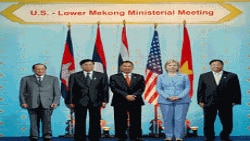U.S. Secretary of State Hillary Clinton recently met with the Foreign Ministers of Cambodia, Laos, Thailand and Vietnam in Hanoi. All 5 countries met in the context of the Lower Mekong Initiative, or LMI. The LMI was created in July 2009 as a means to enhance cooperation in the areas of environment, health, education, and infrastructure development. Since then, the 5 countries have sought to strengthen cooperation in these areas and build on their common interests.
Cooperation is growing in the environmental area. This month saw the formal inauguration of a "sister-river" partnership between the Mekong River Commission and the Mississippi River Commissions, which aims to improve the management of trans-boundary water resources in the lower Mekong.
The United States will also launch a 3-year program to assist the 4 Lower Mekong countries to develop strategies to cope with the impact of climate change on water sources and food security.
In the area of health, U.S. assistance to the Mekong countries under the LMI will total over $147 million in 2010 and focus on targeting pandemic threats. This Emerging Pandemic Threats program will improve early identification of and response to new public health threats that originate in animals. The program will support training for health professionals and veterinarians to detect, track, and contain outbreaks. Additional LMI funding will help monitor and track substandard and counterfeit medicines and establish a regional network to detect drug resistant malaria.
On-going U.S. assistance in the field of HIV/AIDS has provided prevention, care and treatment to over 2 million people across the Mekong region, contributing to a 50 percent reduction in HIV/AIDS infection rate in Cambodia; providing life-saving antiretroviral treatments and other interventions worth $90 million in Vietnam; and in Thailand, supporting the largest clinical trial to date, which demonstrated that a vaccine regimen could be both safe and effective at preventing HIV infection.
Under the Lower Mekong Initiative, the U.S. provides 18 million $ worth of assistance in the area of education. This includes programs to increase access to the Internet in poor, rural areas. Under the International Visitors Leadership Program, regional professionals can travel to the U.S. to learn from their American counterparts. Moreover, professionals in Cambodia, Laos, Thailand, and Vietnam can win scholarships to study and improve their English-language skills.
As Secretary Clinton said, "The United States is back in Southeast Asia... and we are fully engaged with our... partners on the wide range of challenges confronting us."




